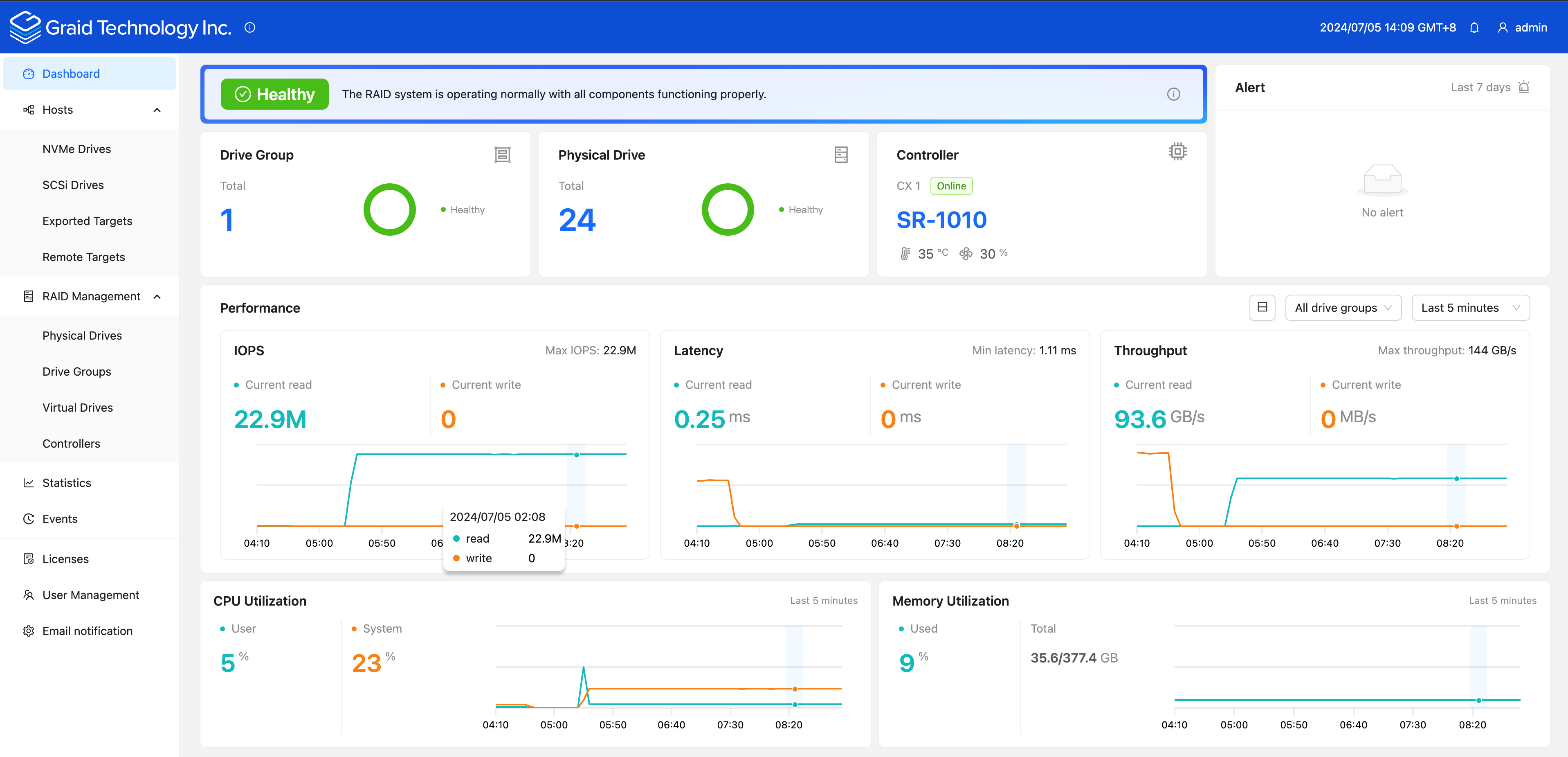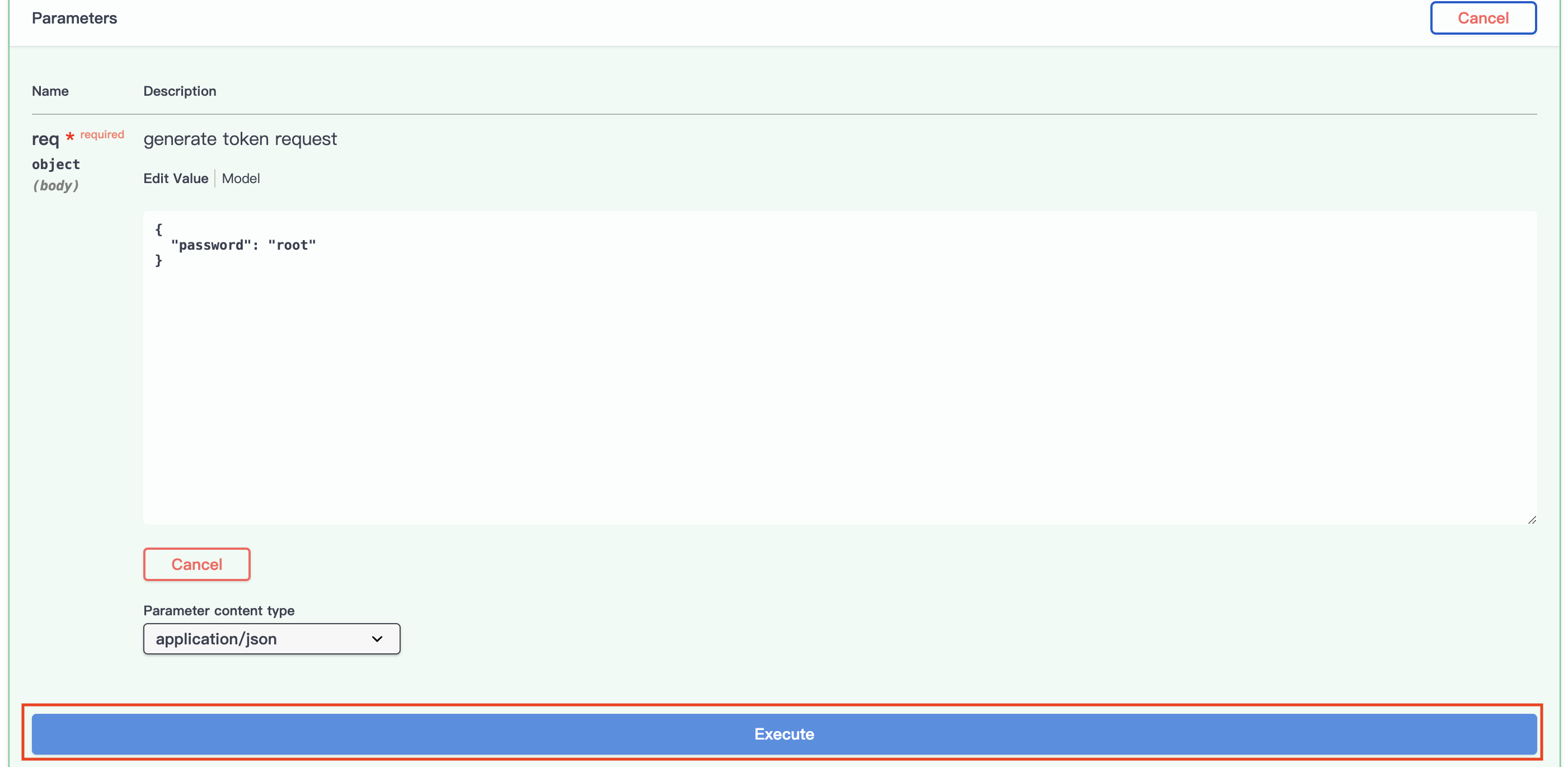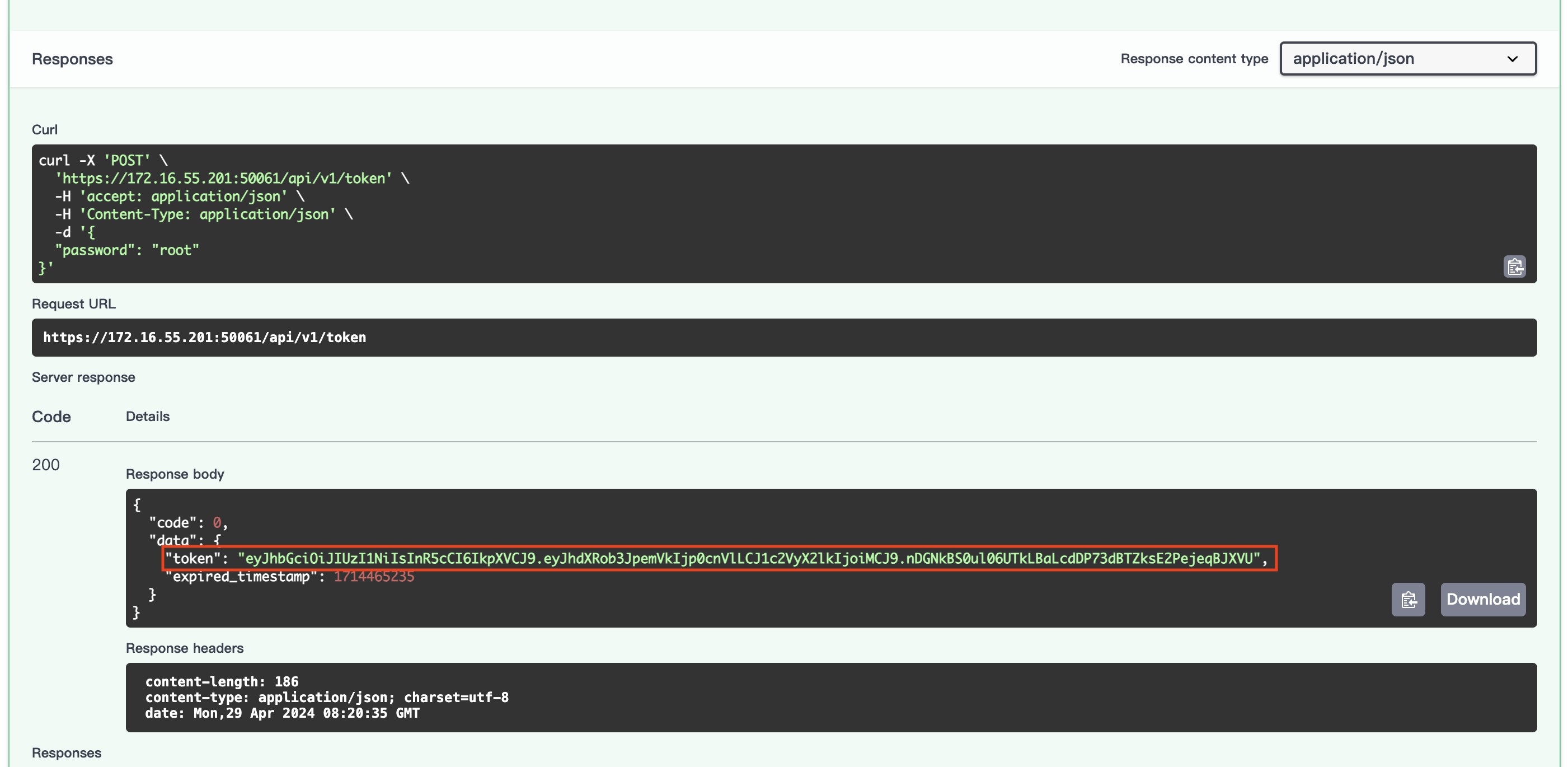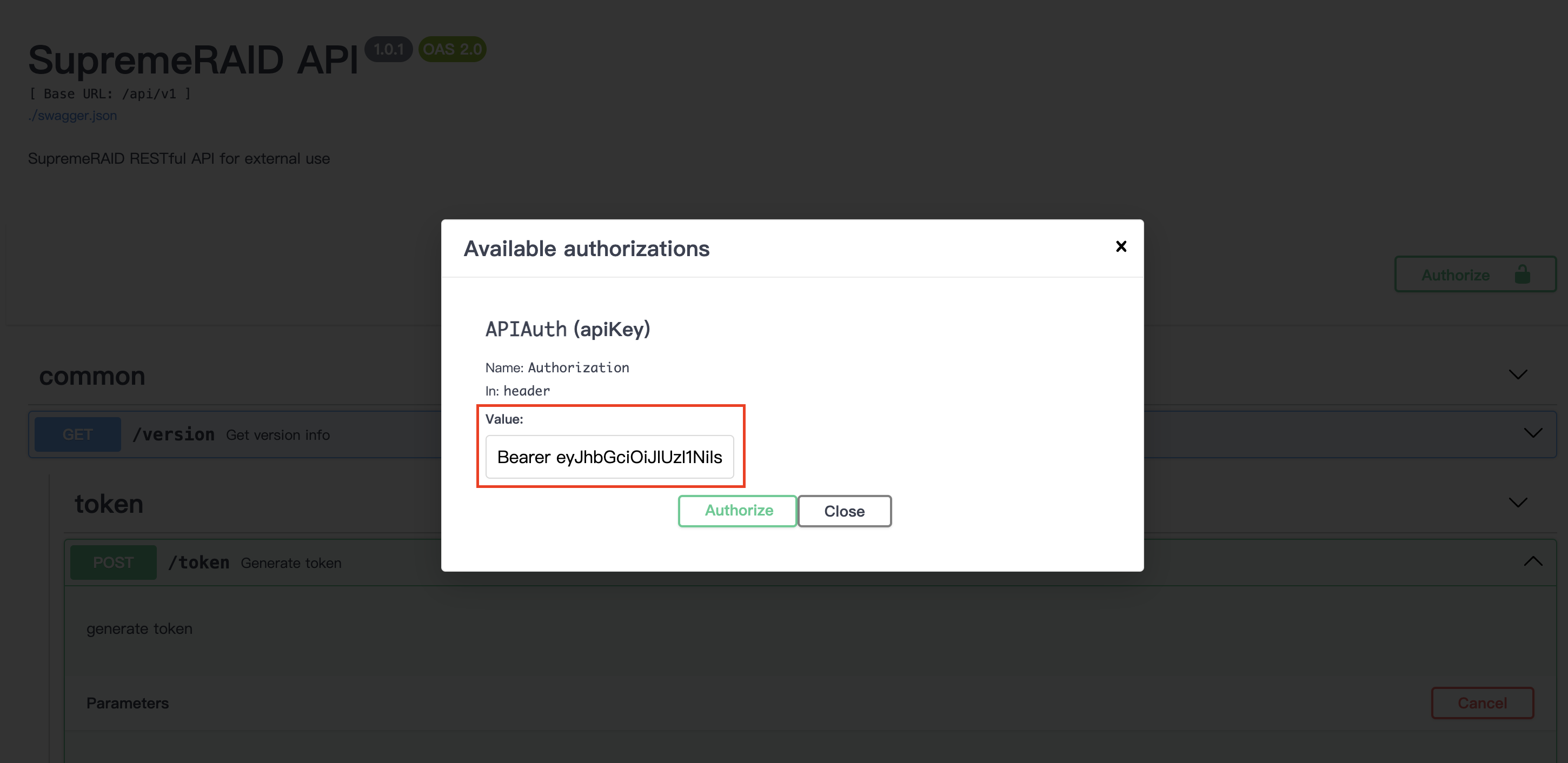SupremeRAID™ Linux Driver 1.6.0 Release Notes, Software and Documentation
Release Date: Jul 05, 2024
New Features
Double Failure Protection with Distributed Journaling
To mitigate the risk of data corruption during a double failure situation—where the array is degraded plus there is an abnormal system shutdown—commonly encountered in RAID5/6 configurations, journaling has been introduced. This feature ensures that incomplete IO operations are replayed upon service restart. Starting from version 1.6, each physical drive in newly created drive groups will automatically reserve a small range for journaling space, activating journaling automatically when the drive group enters a degraded state.
Journaling can be configured with three modes:
- always_off: Journaling is disabled in both optimal and degraded states.
- degraded_only (Default): Journaling is activated only when the drive group is degraded.
- always_on: Journaling is active regardless of the drive group's state (optimal or degraded).
To modify the journaling attribute, use the drive group edit command. For instance, to enable journaling at all times:
Note: Drive groups created with earlier versions of the driver cannot enable this feature.
Preview of Management GUI
To enable comprehensive NVMe RAID management capabilities, Graid Technology provides the 'SupremeRAID™ Management Console'. This web-based graphical user interface offers intuitive visualization and statistical reporting features, addressing the growing demand for visual management tools. The Console delivers real-time monitoring of RAID array status, detailed performance metrics, and streamlined configuration management. However, this feature is embedded in SupremeRAID™ with the default state set to disabled. To enable the Management Console, please follow these steps:
Check the license state, ensure it is in to 'APPLIED' to enable feature usage.
Enable Management Console service.
Open web browser with 'https://[system-ip]:50060', then use default password to login.

Now, you should be able to view the dashboard and begin exploring the management console.

RESTful API
This release includes RESTful API services featuring HTTP response codes, CRUD functionalities, and specific status codes from our SupremeRAID™, simplifying third-party integration. We also offer Swagger-generated interactive documentation to help users test and understand our APIs effectively, please follow these steps to start:
Open web browser with 'https://system-ip:50061/swagger'.
Get an authentication token.



Enter the key to authorize API actions.



Physical Drive Pre-start Hook
This feature allows users to execute customized logic to unlock the physical drive before the SupremeRAID™ driver takes control. Users can specify a script path by adding sed_unlock_script=/path/to/script under the [global] section in the driver configuration file /etc/graid/graidserver.conf. During script execution, the device path (e.g., /dev/nvme#) and the NQN of the corresponding physical drive will be passed as the first and second arguments, respectively.
One use case is integrating with an external Key Management Server (KMS) and using drives that support the SED feature. Users can develop a script to retrieve the SED key from the KMS and unlock the SED drive before the SupremeRAID™ driver brings it up as a physical drive. This way, the SupremeRAID™ driver does not need to hold the key, thereby enhancing security.
SED Key Rotation
Since NVMe drives are directly connected to the CPU, users can utilize SED management tools such as sedcli or sedutil for the complete management lifecycle of SED-supported drives. Thus, the SupremeRAID™ driver only needs to store the admin1 key to unlock the drive before taking control via the GPU. Periodic rotation of these keys is a common practice for enhancing data security, meaning users may need to rotate the admin1 and SID keys while the drive group is operational and under GPU control. This necessitates performing the operation through the SupremeRAID™ driver.
To facilitate this, we introduced a key replacement subcommand enabling users to replace keys during drive group operation. Here's an example of replacing the SID and admin1 key for a physical drive:
If the original key is present in the configuration file provided by the user, the SupremeRAID™ driver will replace the stored key; otherwise, it will only command the SSD to replace the SID and admin1 keys. This command also supports batch key replacement for multiple physical drives. For instance, to replace keys for 23 physical drives sharing the same keys:
Moreover, to simplify key storage for multiple NVMe drives before physical drive creation, we've slightly modified the edit SED key command. The command graidctl edit config sed has been changed to graidctl edit config sed_key, supporting three input methods:
- If only the NQN is specified, the command will prompt the user to enter the keys, avoiding bash history records.
- Specifying both the NQN and SED key facilitates scripting but requires caution regarding bash history.
- The
--input-file option allows importing multiple keys from a file.
Enhancements
- New operating system support:
- RHEL/Rocky Linux/AlmaLinux 8.9/8.10/9.2/9.3/9.4
- Oracle Linux 8.9/8.10/9.2/9.3/9.4
- Ubuntu 22.04.4 with kernel 6.2 and 6.5, Ubuntu 24.04 with kernel 6.8
- Proxmox VE 8.2 with kernel 6.8
Supported Operating Systems
| Linux Distribution | x86_64 |
|---|
| AlmaLinux | 8.5-8.10 (kernel 4.18), 9.0-9.4 (Kernel 5.14) |
| CentOS | 7.9 (Kernel 3.10 and 4.18), 8.3, 8.4, 8.5 (Kernel 4.18) |
| Debian | 11.6 (Kernel 5.10), 12 (Kernel 6.1) |
| openSUSE Leap | 15.2-15.3 (Kernel 5.3), 15.4-15.5 (Kernel 5.14) |
| Oracle Linux | 8.7-8.10 (RHCK 4.18 and UEK 5.15), 9.1-9.4 (RHCK 5.14 and UEK 5.15) |
| RHEL | 7.9 (Kernel 3.10 or 4.18), 8.3-8.10 (Kernel 4.18), 9.0-9.4 (Kernel 5.14) |
| Proxmox VE | 8.1 (Kernel 6.5), 8.2 (Kernel 6.8) |
| Rocky Linux | 8.5-8.10 (Kernel 4.18), 9.0-9.4 (Kernel 5.14) |
| SLES | 15 SP2-SP3 (Kernel 5.3), 15 SP4-SP5 (Kernel 5.14) |
| Ubuntu | 20.04.0-20.04.4 (Kernel 5.4 and 5.15), 22.04.0-22.04.2 (Kernel 5.15), 22.04.3-22.04.4 (Kernel 6.2), 24.04 (Kernel 6.8) |
Dependencies and Utilities
Driver Package
Compatible NVMe Drives
Dapustor
| Series | Interface | Form Factor |
|---|
| R5100 | PCIe Gen4 x 4 | 2.5 inch U.2 |
| R5301 | PCIe Gen4 x 4 | 2.5 inch U.2 |
| H5100 | PCIe Gen5 x 4 | 2.5 inch U.2 |
HAGIWARA
| Series | Interface | Form Factor |
|---|
| JN2E3840 | PCIe Gen4 x 4 | 2.5 inch U.2 |
Intel / Solidigm
| Series | Interface | Form Factor |
|---|
| DC P4510 | PCIe Gen3 x 4 | 2.5 inch U.2 |
| DC P4610 | PCIe Gen3 x 4 | 2.5 inch U.2 |
| D5-P5316 | PCIe Gen4 x 4 | 2.5 inch U.2 |
| D5-P5336 | PCIe Gen4 x 4 | 2.5 inch U.2 |
| D7-P5510 | PCIe Gen4 x 4 | 2.5 inch U.2 |
| D7-P5520 | PCIe Gen4 x 4 | 2.5 inch U.2 |
| D7-P5620 | PCIe Gen4 x 4 | 2.5 inch U.2 |
| D5-P5430 | PCIe Gen4 x 4 | 2.5 inch U.2 |
| D7-P5810 | PCIe Gen4 x 4 | 2.5 inch U.2 |
| Optane™ P5800X | PCIe Gen4 x 4 | 2.5 inch U.2 |
Kingston
| Series | Interface | Form Factor |
|---|
| DC1500M | PCIe Gen3 x 4 | 2.5 inch U.2 |
KIOXIA
| Series | Interface | Form Factor |
|---|
| CD5 | PCIe Gen3 x 4 | 2.5 inch U.2 |
| CD6 | PCIe Gen4 x 4 | 2.5 inch U.3 |
| CM6 | PCIe Gen4 x 4 | 2.5 inch U.3 |
| CD8 | PCIe Gen4 x 4 | 2.5 inch U.2/U.3 |
| CM7 | PCIe Gen5 x 4 | 2.5 inch U.2/E3.S |
| CD8P | PCIe Gen5 x 4 | 2.5 inch U.2/E3.S |
| XD7P | PCIe Gen5 x 4 | E1.S |
Memblaze
| Series | Interface | Form Factor |
|---|
| P6536 | PCIe Gen4 x 4 | 2.5 inch U.2 |
Micron
| Series | Interface | Form Factor |
|---|
| 7300 | PCIe Gen3 x 4 | 2.5 inch U.2 |
| 7450 | PCIe Gen4 x 4 | 2.5 inch U.3 |
| 9400 | PCIe Gen4 x 4 | 2.5 inch U.2/U.3 |
Petaio
| Series | Interface | Form Factor |
|---|
| P8118 | PCIe Gen4 x 4 | 2.5 inch U.2 |
Phison
| Series | Interface | Form Factor |
|---|
| PASCARI X100 | PCIe Gen4 x 4 | 2.5 inch U.3 |
| PASCARI X200 | PCIe Gen5 x 4 | 2.5 inch U.2/E3.S |
Samsung
| Series | Interface | Form Factor |
|---|
| PM983 | PCIe Gen3 x 4 | 2.5 inch U.2 |
| PM9A3 | PCIe Gen4 x 4 | 2.5 inch U.2 |
| PM1733 | PCIe Gen4 x 4 | 2.5 inch U.2 |
| PM1735 | PCIe Gen4 x 8 | HHHL AIC |
| PM1743 | PCIe Gen5 x 4 | 2.5 inch U.2/E3.S |
ScaleFlux
| Series | Interface | Form Factor |
|---|
| CSD 3000 | PCIe Gen4 x 4 | 2.5 inch U.2 |
Seagate
| Series | Interface | Form Factor |
|---|
| NYTRO 5550H | PCIe Gen4 x 4 | 2.5 inch U.2 |
WD
| Series | Interface | Form Factor |
|---|
| Ultrastar DC SN640 | PCIe Gen3 x 4 | 2.5 inch U.2 |
| Ultrastar DC SN650 | PCIe Gen4 x 4 | 2.5 inch U.2 |
| Ultrastar DC SN655 | PCIe Gen4 x 4 | 2.5 inch U.2 |
Supported Server Models
Altos
Intel
| Model Name | Dimensions | Processors | PCIe | NVMe Bays |
|---|
| Altos BrainSphereTM R360 F5 | 1U | 3rd Gen Intel® Xeon® Scalable Processors | Gen4 | 12 |
| Altos BrainSphereTM R380 F5 | 2U | 3rd Gen Intel® Xeon® Scalable Processors | Gen4 | 22 |
| Altos BrainSphereTM T350 F5 | 5U | 3rd Gen Intel® Xeon® Scalable Processors | Gen4 | 4 |
AsRock
Intel
| Model Name | Dimensions | Processors | PCIe | NVMe Bays |
|---|
| 1U4L4E-EGS/2T | 1U | 4th/5th Gen Intel® Xeon® Scalable Processors | Gen5 | 4 |
| 1U8S4E-EGS/2T | 1U | 4th/5th Gen Intel® Xeon® Scalable Processors | Gen5 | 4 |
AMD
| Model Name | Dimensions | Processors | PCIe | NVMe Bays |
|---|
| 1U12E-GENOA-2L2T | 1U | AMD EPYC™ 9004 series processor family | Gen5 | 12 |
| 1U4L4E-GENOA/2T | 1U | AMD EPYC™ 9004 series processor family | Gen5 | 4 |
| 1U8S4E-GENOA/2T | 1U | AMD EPYC™ 9004 series processor family | Gen5 | 4 |
| 2U24E-GENOA2 | 2U | AMD EPYC™ 9004 series processor family | Gen5 | 24 |
ASUS
Intel
| Model Name | Dimensions | Processors | PCIe | NVMe Bays |
|---|
| RS700-E10-RS12U | 1U | 3rd Gen Intel® Xeon® Scalable Processors | Gen4 | 12 |
| RS700-E10-RS4U | 1U | 3rd Gen Intel® Xeon® Scalable Processors | Gen4 | 4 |
| RS700-E11-RS12U | 1U | 4th/5th Gen Intel® Xeon® Scalable Processors | Gen5 | 12 |
| RS700-E11-RS4U | 1U | 4th/5th Gen Intel® Xeon® Scalable Processors | Gen5 | 4 |
| RS720-E10-RS12 | 2U | 3rd Gen Intel® Xeon® Scalable Processors | Gen4 | 8 |
| RS720-E10-RS12E | 2U | 3rd Gen Intel® Xeon® Scalable Processors | Gen4 | 8 |
| RS720-E10-RS24U | 2U | 3rd Gen Intel® Xeon® Scalable Processors | Gen4 | 24 |
| RS720-E11-RS12U | 2U | 4th/5th Gen Intel® Xeon® Scalable Processors | Gen5 | 12 |
| RS720-E11-RS24U | 2U | 4th/5th Gen Intel® Xeon® Scalable Processors | Gen5 | 24 |
AMD
| Model Name | Dimensions | Processors | PCIe | NVMe Bays |
|---|
| RS500A-E11-RS12U | 1U | AMD EPYC™ 7003 series processor family | Gen4 | 12 |
| RS500A-E11-RS4U | 1U | AMD EPYC™ 7003 series processor family | Gen4 | 4 |
| RS500A-E12-RS12U | 1U | AMD EPYC™ 9004 series processor family | Gen5 | 12 |
| RS500A-E12-RS4U | 1U | AMD EPYC™ 9004 series processor family | Gen5 | 4 |
| RS700A-E11-RS12U | 1U | AMD EPYC™ 7003 series processor family | Gen4 | 12 |
| RS700A-E11-RS4U | 1U | AMD EPYC™ 7003 series processor family | Gen4 | 4 |
| RS700A-E12-RS12U | 1U | AMD EPYC™ 9004 series processor family | Gen5 | 12 |
| RS700A-E12-RS4U | 1U | AMD EPYC™ 9004 series processor family | Gen5 | 4 |
| RS520A-E11-RS12U | 2U | AMD EPYC™ 7003 series processor family | Gen4 | 12 |
| RS520A-E11-RS24U | 2U | AMD EPYC™ 7003 series processor family | Gen4 | 24 |
| RS520A-E12-RS12U | 2U | AMD EPYC™ 9004 series processor family | Gen5 | 12 |
| RS520A-E12-RS24U | 2U | AMD EPYC™ 9004 series processor family | Gen5 | 24 |
| RS720A-E11-RS12 | 2U | AMD EPYC™ 7003 series processor family | Gen4 | 8 |
| RS720A-E11-RS24U | 2U | AMD EPYC™ 7003 series processor family | Gen4 | 24 |
| RS720A-E12-RS12 | 2U | AMD EPYC™ 9004 series processor family | Gen5 | 8 |
| RS720A-E12-RS24 | 2U | AMD EPYC™ 9004 series processor family | Gen5 | 16 |
| RS720A-E12-RS24U | 2U | AMD EPYC™ 9004 series processor family | Gen5 | 24 |
Compal
Intel
| Model Name | Dimensions | Processors | PCIe | NVMe Bays |
|---|
| SR220-2 | 2U | 4th/5th Gen Intel® Xeon® Scalable Processors | Gen5 | 24 |
Dell
Intel
| Model Name | Dimensions | Processors | PCIe | NVMe Bays |
|---|
| PowerEdge R660 | 1U | 4th/5th Gen Intel®Xeon® Scalable Processors | Gen5 | 10 |
| PowerEdge R750 | 2U | 3rd Gen Intel® Xeon® Scalable Processors | Gen4 | 24 |
| PowerEdge R760 | 2U | 4th/5th Gen Intel®Xeon® Scalable Processors | Gen5 | 24 |
| PowerEdge R960 | 4U | 4th/5th Gen Intel®Xeon® Scalable Processors | Gen5 | 24 |
AMD
| Model Name | Dimensions | Processors | PCIe | NVMe Bays |
|---|
| PowerEdge R6625 | 1U | AMD EPYC™ 9004 series processor family | Gen5 | 10 |
| PowerEdge R7625 | 2U | AMD EPYC™ 9004 series processor family | Gen5 | 24 |
Gigabyte
Intel
| Model Name | Dimensions | Processors | PCIe | NVMe Bays |
|---|
| R163-S32-AAC1 | 1U | 4th/5th Gen Intel® Xeon® Scalable Processors | Gen5 | 12 |
| R163-S32-AAC2 | 1U | 4th/5th Gen Intel® Xeon® Scalable Processors | Gen5 | 4 |
| R181-NA0 | 1U | 2nd Gen Intel® Xeon® Scalable Processors | Gen4 | 10 |
| R182-34A | 1U | 3rd Gen Intel® Xeon® Scalable Processors | Gen4 | 2 |
| R182-M80 | 1U | 3rd Gen Intel® Xeon® Scalable Processors | Gen4 | 4 |
| R182-N20 | 1U | 3rd Gen Intel® Xeon® Scalable Processors | Gen4 | 2 |
| R182-NA0 | 1U | 3rd Gen Intel® Xeon® Scalable Processors | Gen4 | 10 |
| R183-S90-AAD1 | 1U | 4th/5th Gen Intel® Xeon® Scalable Processors | Gen5 | 4 |
| R183-S90-AAV1 | 1U | 4th/5th Gen Intel® Xeon® Scalable Processors | Gen5 | 12 |
| R183-S92-AAD1 | 1U | 4th/5th Gen Intel® Xeon® Scalable Processors | Gen5 | 4 |
| R183-S92-AAD2 | 1U | 4th/5th Gen Intel® Xeon® Scalable Processors | Gen5 | 4 |
| R183-S92-AAV1 | 1U | 4th/5th Gen Intel® Xeon® Scalable Processors | Gen5 | 12 |
| R183-S92-AAV2 | 1U | 4th/5th Gen Intel® Xeon® Scalable Processors | Gen5 | 4 |
| S183-SH0-AAJ1 | 1U | 4th/5th Gen Intel® Xeon® Scalable Processors | Gen5 | 32 |
| S183-SH0-AAV1 | 1U | 4th/5th Gen Intel® Xeon® Scalable Processors | Gen5 | 32 |
| R263-S30-AAC1 | 2U | 4th/5th Gen Intel® Xeon® Scalable Processors | Gen5 | 4 |
| R281-3C1 | 2U | 2nd Gen Intel® Xeon® Scalable Processors | Gen4 | 0 |
| R282-3C0 | 2U | 3rd Gen Intel® Xeon® Scalable Processors | Gen4 | 4 |
| R282-3C1 | 2U | 3rd Gen Intel® Xeon® Scalable Processors | Gen4 | 4 |
| R282-3C2 | 2U | 3rd Gen Intel® Xeon® Scalable Processors | Gen4 | 4 |
| R282-G30 | 2U | 3rd Gen Intel® Xeon® Scalable Processors | Gen4 | 4 |
| R282-N80 | 2U | 3rd Gen Intel® Xeon® Scalable Processors | Gen4 | 8 |
| R282-NA0 | 2U | 3rd Gen Intel® Xeon® Scalable Processors | Gen4 | 24 |
| R282-NO0 | 2U | 3rd Gen Intel® Xeon® Scalable Processors | Gen4 | 24 |
| R283-S90-AAE1 | 2U | 4th/5th Gen Intel® Xeon® Scalable Processors | Gen5 | 4 |
| R283-S90-AAE3 | 2U | 4th/5th Gen Intel® Xeon® Scalable Processors | Gen5 | 12 |
| R283-S90-AAJ1 | 2U | 4th/5th Gen Intel® Xeon® Scalable Processors | Gen5 | 4 |
| R283-S90-AAJ3 | 2U | 4th/5th Gen Intel® Xeon® Scalable Processors | Gen5 | 12 |
| R283-S92-AAE1 | 2U | 4th/5th Gen Intel® Xeon® Scalable Processors | Gen5 | 24 |
| R283-S92-AAJ1 | 2U | 4th/5th Gen Intel® Xeon® Scalable Processors | Gen5 | 4 |
| R292-4S0 | 2U | 3rd Gen Intel® Xeon® Scalable Processors | Gen4 | 10 |
| R292-4S1 | 2U | 3rd Gen Intel® Xeon® Scalable Processors | Gen4 | 10 |
| G492-HA0 | 4U | 3rd Gen Intel® Xeon® Scalable Processors | Gen4 | 8 |
AMD
| Model Name | Dimensions | Processors | PCIe | NVMe Bays |
|---|
| R152-Z32 | 1U | AMD EPYC™ 7003 series processor family | Gen4 | 10 |
| R152-Z33 | 1U | AMD EPYC™ 7003 series processor family | Gen4 | 10 |
| R162-Z10 | 1U | AMD EPYC™ 7003 series processor family | Gen4 | 10 |
| R162-Z11 | 1U | AMD EPYC™ 7003 series processor family | Gen4 | 4 |
| R162-ZA1-100 | 1U | AMD EPYC™ 7003 series processor family | Gen4 | 4 |
| R162-ZA1-A00 | 1U | AMD EPYC™ 7003 series processor family | Gen4 | 4 |
| R163-Z32-AAC1 | 1U | AMD EPYC™ 9004 series processor family | Gen5 | 12 |
| R163-Z32-AAC2 | 1U | AMD EPYC™ 9004 series processor family | Gen5 | 4 |
| R163-Z35-AAC1 | 1U | AMD EPYC™ 9004 series processor family | Gen5 | 12 |
| R163-Z35-AAH1 | 1U | AMD EPYC™ 9004 series processor family | Gen5 | 12 |
| R181-Z92 | 1U | AMD EPYC™ 7003 series processor family | Gen4 | 10 |
| R182-Z92 | 1U | AMD EPYC™ 7003 series processor family | Gen4 | 10 |
| R182-Z93 | 1U | AMD EPYC™ 7003 series processor family | Gen4 | 10 |
| R183-Z90-AAD1 | 1U | AMD EPYC™ 9004 series processor family | Gen5 | 4 |
| R183-Z92-AAD1 | 1U | AMD EPYC™ 9004 series processor family | Gen5 | 12 |
| R183-Z92-AAD2 | 1U | AMD EPYC™ 9004 series processor family | Gen5 | 4 |
| R183-Z92-AAV1 | 1U | AMD EPYC™ 9004 series processor family | Gen5 | 12 |
| G292-Z40 | 2U | AMD EPYC™ 7003 series processor family | Gen4 | 4 |
| R263-Z30-AAC1 | 2U | AMD EPYC™ 9004 series processor family | Gen5 | 12 |
| R263-Z30-AAC2 | 2U | AMD EPYC™ 9004 series processor family | Gen5 | 4 |
| R263-Z32-AAD1 | 2U | AMD EPYC™ 9004 series processor family | Gen5 | 12 |
| R263-Z33-AAF1 | 2U | AMD EPYC™ 9004 series processor family | Gen5 | 8 |
| R263-Z33-AAL1 | 2U | AMD EPYC™ 9004 series processor family | Gen5 | 8 |
| R263-Z36-AAD1 | 2U | AMD EPYC™ 9004 series processor family | Gen5 | 24 |
| R263-Z36-AAE1 | 2U | AMD EPYC™ 9004 series processor family | Gen5 | 24 |
| R263-Z36-AAJ1 | 2U | AMD EPYC™ 9004 series processor family | Gen5 | 24 |
| R263-Z36-AAV1 | 2U | AMD EPYC™ 9004 series processor family | Gen5 | 24 |
| R272-Z32 | 2U | AMD EPYC™ 7003 series processor family | Gen4 | 24 |
| R272-Z34 | 2U | AMD EPYC™ 7003 series processor family | Gen4 | 24 |
| R281-Z91 | 2U | AMD EPYC™ 7003 series processor family | Gen4 | 6 |
| R281-Z92 | 2U | AMD EPYC™ 7003 series processor family | Gen4 | 24 |
| R282-Z92 | 2U | AMD EPYC™ 7003 series processor family | Gen4 | 24 |
| R282-Z96 | 2U | AMD EPYC™ 7003 series processor family | Gen4 | 24 |
| R282-Z9G | 2U | AMD EPYC™ 7003 series processor family | Gen4 | 24 |
| R283-Z90-AAD1 | 2U | AMD EPYC™ 9004 series processor family | Gen5 | 12 |
| R283-Z90-AAD2 | 2U | AMD EPYC™ 9004 series processor family | Gen5 | 4 |
| R283-Z92-AAE1 | 2U | AMD EPYC™ 9004 series processor family | Gen5 | 24 |
| R283-Z93-AAF1 | 2U | AMD EPYC™ 9004 series processor family | Gen5 | 24 |
| R283-Z93-AAL1 | 2U | AMD EPYC™ 9004 series processor family | Gen5 | 24 |
| R283-Z96-AAE1 | 2U | AMD EPYC™ 9004 series processor family | Gen5 | 24 |
| R283-ZF0-AAL1 | 2U | AMD EPYC™ 9004 series processor family | Gen5 | 8 |
| R283-ZF0-IAL1 | 2U | AMD EPYC™ 9004 series processor family | Gen5 | 8 |
| G492-Z50 | 4U | AMD EPYC™ 7003 series processor family | Gen4 | 8 |
| G492-Z51 | 4U | AMD EPYC™ 7003 series processor family | Gen4 | 8 |
| G492-ZD0 | 4U | AMD EPYC™ 7003 series processor family | Gen4 | 8 |
| G492-ZD2 | 4U | AMD EPYC™ 7003 series processor family | Gen4 | 6 |
Lenovo
Intel
| Model Name | Dimensions | Processors | PCIe | NVMe Bays |
|---|
| ThinkSystem SR630 V3 | 1U | 4th/5th Gen Intel® Xeon® Scalable Processors | Gen5 | 10 |
MicroStar
Intel
| Model Name | Dimensions | Processors | PCIe | NVMe Bays |
|---|
| S1205 Series | 1U | 4th Gen Intel® Xeon® Scalable Processors | Gen4 | 12 |
| S2205 Series | 2U | 4th Gen Intel® Xeon® Scalable Processors | Gen4 | 24 |
AMD
| Model Name | Dimensions | Processors | PCIe | NVMe Bays |
|---|
| S1206 Series | 1U | AMD EPYC™ 9004 series processor family | Gen5 | 12 |
| S2206 Series | 2U | AMD EPYC™ 9004 series processor family | Gen5 | 24 |
SuperMicro
The following models have passed Supermicro's validation for drive LED indicator behavior.
Intel
| Model Name | Dimensions | Processors | PCIe | NVMe Bays |
|---|
| SSG-121E-NES24R | 1U | 4th/5th Gen Intel® Xeon® Scalable Processors | Gen5 | 24 |
| SYS-1029P-N32R | 1U | 2nd Gen Intel® Xeon® Scalable Processors | Gen3 | 0 |
| SYS-121C-TN10R | 1U | 4th/5th Gen Intel® Xeon® Scalable Processors | Gen5 | 10 |
| SYS-221H-TN24R | 2U | 4th/5th Gen Intel® Xeon® Scalable Processors | Gen5 | 24 |
| SYS-241E-TNRTTP | 2U | 4th/5th Gen Intel® Xeon® Scalable Processors | Gen5 | 12 |
| SYS-620C-TN12R | 2U | 3rd Gen Intel® Xeon® Scalable Processors | Gen4 | 12 |
| SYS-621H-TN12R | 2U | 4th/5th Gen Intel® Xeon® Scalable Processors | Gen5 | 12 |
AMD
| Model Name | Dimensions | Processors | PCIe | NVMe Bays |
|---|
| AS -1124US-TNRP | 1U | AMD EPYC™ 9004 series processor family | Gen5 | 12 |
| AS -1115CS-TNR | 1U | AMD EPYC™ 9004 series processor family | Gen5 | 10 |
| AS-2015CS-TNR | 2U | AMD EPYC™ 9004 series processor family | Gen5 | 12 |
| AS-2015HS-TNR | 2U | AMD EPYC™ 9004 series processor family | Gen5 | 12 |
| AS-2025HS-TNR | 2U | AMD EPYC™ 9004 series processor family | Gen5 | 12 |
| AS-2125HS-TNR | 2U | AMD EPYC™ 9004 series processor family | Gen5 | 24 |
| ASG-2115S-NE332R | 2U | AMD EPYC™ 9004 series processor family | Gen5 | 32 |
Tyan
Intel
| Model Name | Dimensions | Processors | PCIe | NVMe Bays |
|---|
| Thunder CX GC68A-B7136 | 1U | 4th/5th Gen Intel® Xeon® Scalable Processors | Gen5 | 8 |
| Thunder CX GC79A-B7132 | 1U | 4th/5th Gen Intel® Xeon® Scalable Processors | Gen5 | 12 |
| Thunder HX TS75A-B7132 | 2U | 4th/5th Gen Intel® Xeon® Scalable Processors | Gen5 | 16 |
| Thunder SX TS70-B7136 | 2U | 4th/5th Gen Intel® Xeon® Scalable Processors | Gen5 | 4 |
| Thunder SX TS70A-B7136 | 2U | 4th/5th Gen Intel® Xeon® Scalable Processors | Gen5 | 8 |
| Thunder HX FT83A-B7129 | 4U | 3rd Gen Intel® Xeon® Scalable Processors | Gen4 | 4 |
AMD
| Model Name | Dimensions | Processors | PCIe | NVMe Bays |
|---|
| Transport CX GC68A-B8056 | 1U | AMD EPYC™ 9004 series processor family | Gen5 | 12 |
| Transport SX TS70-B8056 | 2U | AMD EPYC™ 9004 series processor family | Gen5 | 4 |
| Transport SX TS70A-B8056 | 2U | AMD EPYC™ 9004 series processor family | Gen5 | 26 |
QCT
Intel
| Model Name | Dimensions | Processors | PCIe | NVMe Bays |
|---|
| QuantaGrid D54X-1U | 1U | 4th/5th Gen Intel® Xeon® Scalable Processors | Gen5 | 12 |
| QuantaGrid D54U-2U | 2U | 4th/5th Gen Intel® Xeon® Scalable Processors | Gen5 | 24 |
Known Issues and Limitations
- The failed indicator would not indicate when SAS/SATA drives have been removed.
- The drive status will not turn into missing immediately when the SAS/SATA drive is pulled out.
- On some server models, slot IDs for SAS/SATA physical drives might not display properly.
- Did not support NVMeoF physical drives which exported from Ubuntu 20.04 (kernel < 5.15).








